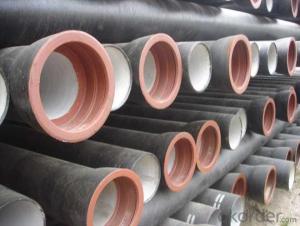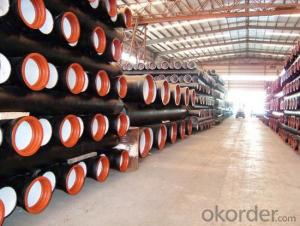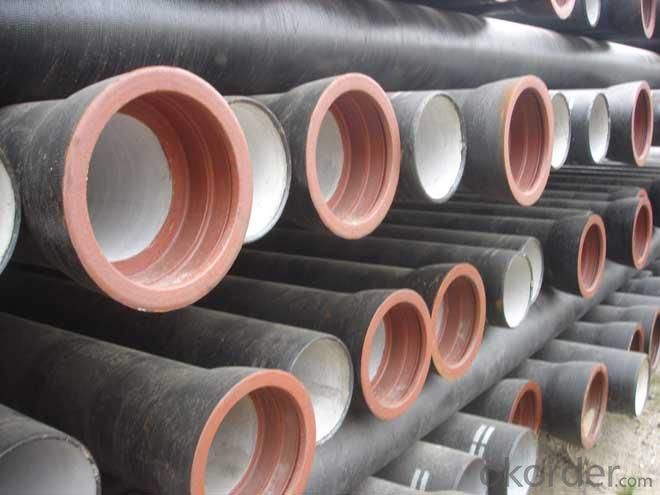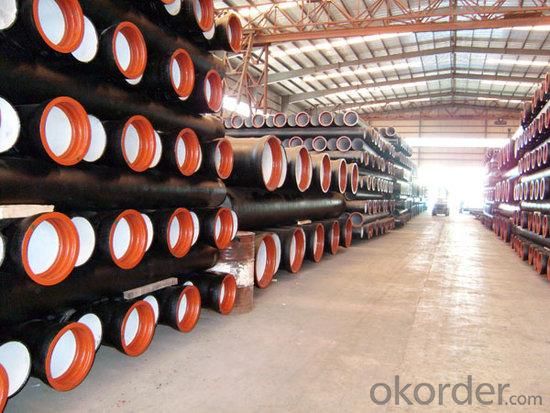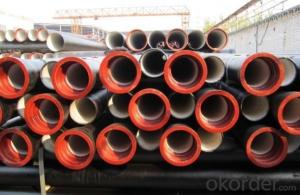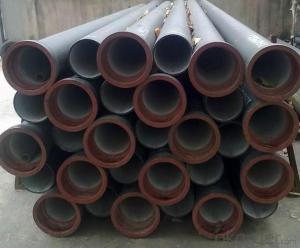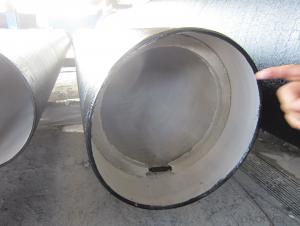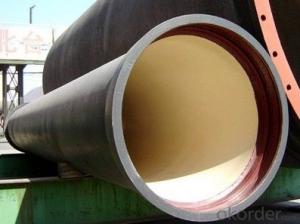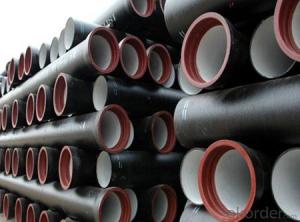Ductile Iron Pipe of China DN900 EN598 On Sale
- Loading Port:
- China main port
- Payment Terms:
- TT or LC
- Min Order Qty:
- 20 m.t.
- Supply Capability:
- 100000 m.t./month
OKorder Service Pledge
OKorder Financial Service
You Might Also Like
1,Ductile Iron Pipe Description :
1) Pipes confirm to ISO2531,K9 class,T type joint,6m long,with inside cements lining conform to ISO4179, outside Zinc spraying(130g/m2) and bitumen coating(70μm) conform to ISO8179.
2) Pipe ends: Spigot and socket ends, with 100% SBR rubber gaskets accoding to ISO4633
3) we can do third party inspection according to customer's request.
2,Main Features of the Ductile Iron Pipe:
•High yield strength
•High tensile Strength
•High corrosion resistance
•Pressure Resistence
•Satisfy the highest hygienic standards
3,Ductile Iron Pipe Images:
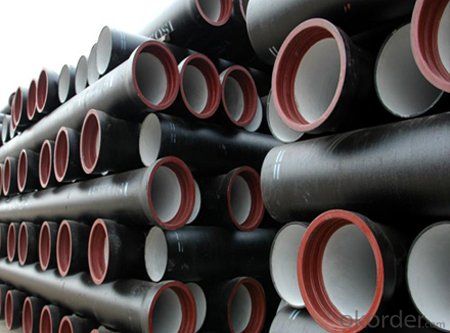
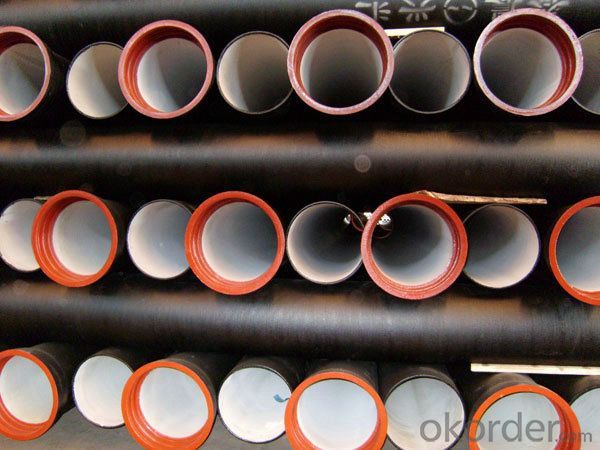
4. Ductile Iron Pipe Specification:
Surface Finishes: Bare, Oiled, Mill Varnish, Galv,FBE, FBE Dual, 3LPE, 3LPP, Coal Tar,Concrete Coating and Tape Wrap
End Finishes: Beveled, Square Cut, Threaded, hat
Additional Services: Internal Coating
Packaging: packed in bag, plastic bag, steel strip, steel wire,double wire, iron box, wooden box, tarpaulin, plastic sheeting
Test: X-ray, UT, magnetic particle,inspection,hydrostatic test.
Processing service: Beveling, Threading, Slotting, Cut-to length, Bends, Quench and Temper, Fabrication, Double-jointing and On-site assistance
5.FAQ:
We have organized several common questions for our clients,may help you sincerely:
1.Q: Why would you choose ductile iron pipe rather than other pipe materials?
A:The reasons are obvious for that not only ductile iron pipe possesses the inherent strength and flexibility of ductile iron, combined with proven corrosion protection systems, but also the cost savings can be achieved from design to installation and commissioning.
2.Q:Why can you guarantee the inner of pipes can’t be corroded?
A: High alumina cement mortar lining and sulphate-resistant cement mortar lining. These two special linings are applicable to inner anti-corrosion for sewage pipes, improving resistance to erosion of the sewage components.
- Q: Are ductile iron pipes suitable for irrigation systems?
- Yes, ductile iron pipes are suitable for irrigation systems. They are known for their strength, durability, and corrosion resistance, making them a reliable choice for transporting water in agricultural settings. Additionally, ductile iron pipes can withstand high pressure and are resistant to external loadings, making them ideal for irrigation systems that require efficient water distribution.
- Q: Ductile iron pipe joint damage, water leakage, want to see the connection with other pipe fittings, how to operate?!
- The ductile iron pipe can be used as the plugging device for the big part
- Q: Ductile iron pipe converter, steel transition DN100 turn 100, what is the specific accessories name? Can you supply photos?
- Strong toughness: the pipe can be stretched to 5 times the original length without fracture, which is suitable for uneven geological conditions without affecting its link performance. In the case of a breach, there is no extension of the mouth due to the breach.
- Q: When the ductile iron pipe is pressed, the three links are always running out. What should be done?
- If the pipe is not laid, but installed outdoors, it is recommended to cement the pier and stabilize the pipe at the three and the pipe connection. The problem of the above situation lies in the pressure test in the open air, the outer wall of the pipe without the external pressure and the balance of internal pressure. Xin hot pipe industry
- Q: Can ductile iron pipes be used for irrigation of sports fields?
- Yes, ductile iron pipes can be used for irrigation of sports fields. Ductile iron pipes are known for their durability, strength, and corrosion resistance, making them suitable for various applications, including irrigation. They can effectively transport water over long distances and withstand the pressure required for irrigation systems. Additionally, ductile iron pipes have a long lifespan, reducing the need for frequent replacements and ensuring reliable irrigation for sports fields.
- Q: Are ductile iron pipes resistant to alkaline attacks?
- Generally, ductile iron pipes have resistance against alkaline attacks. Ductile iron is renowned for its durability and ability to resist corrosion, making it suitable for a range of applications, including water and wastewater systems. Certain metals can experience corrosion from alkaline substances, such as high pH levels in water or chemicals. However, ductile iron has been specially engineered to withstand these conditions. Its composition, which includes the addition of alloying elements like nickel and chromium, enhances its resistance to alkaline attacks. Moreover, ductile iron pipes are frequently coated with protective substances like cement mortar or polyethylene, which further increase their resistance against alkaline substances. Nevertheless, it is important to consider that the specific resistance of ductile iron pipes to alkaline attacks can be influenced by various factors, such as the concentration and duration of exposure to alkaline substances, as well as the presence of other corrosive agents. Therefore, it is always advisable to consult with manufacturers or industry experts to ensure the appropriateness of ductile iron pipes for specific alkaline environments.
- Q: Are ductile iron pipes suitable for tunneling projects?
- Yes, ductile iron pipes are suitable for tunneling projects. They have high strength and flexibility, making them able to withstand the ground movement and settling that can occur during tunnel construction. Additionally, their corrosion resistance and longevity make them a reliable choice for underground applications.
- Q: Are ductile iron pipes suitable for use in saltwater environments?
- Due to their vulnerability to corrosion, ductile iron pipes are generally deemed unsuitable for deployment in saltwater environments. Saltwater, being highly corrosive, can expedite the deterioration of ductile iron pipes. Although ductile iron pipes are known for their strength and durability, they possess a greater susceptibility to corrosion in saltwater when compared to alternative materials such as stainless steel or corrosion-resistant alloys. Consequently, it is advisable to employ materials that are specifically engineered for saltwater environments to guarantee sustained functionality and prevent costly repairs or replacements.
- Q: What is the expected joint deflection of ductile iron pipes?
- The expected joint deflection of ductile iron pipes depends on various factors such as the diameter of the pipe, the type of joint used, and the specific conditions of the installation. In general, ductile iron pipes are designed to accommodate some degree of deflection at the joints to allow for flexibility and movement. The American Water Works Association (AWWA) provides guidelines for the maximum allowable joint deflection for ductile iron pipes. According to AWWA C151/A21.51, the maximum deflection at the joint should typically not exceed 3 degrees or 1% of the nominal pipe diameter, whichever is greater. It is important to note that joint deflection should be within the specified limits to ensure the structural integrity and performance of the pipeline system. Excessive joint deflection can lead to leaks, failures, and reduced lifespan of the pipes. To determine the exact expected joint deflection for a specific installation, it is best to refer to the manufacturer's specifications and guidelines, as they may vary depending on the pipe size, joint type, and other factors. Consulting with a qualified engineer or contacting the manufacturer directly can provide more accurate information tailored to the specific project requirements.
- Q: What is a graphite cast iron pipe?
- Ordinary cast iron consists of gray cast iron and ductile iron, the difference is the carbon in cast iron (graphite) exist, graphite in gray cast iron is in the shape of flake, so the strength and toughness are poor; graphite in shape is spherical, with little on dissevered the matrix. So strong and toughness will be much better.
Send your message to us
Ductile Iron Pipe of China DN900 EN598 On Sale
- Loading Port:
- China main port
- Payment Terms:
- TT or LC
- Min Order Qty:
- 20 m.t.
- Supply Capability:
- 100000 m.t./month
OKorder Service Pledge
OKorder Financial Service
Similar products
Hot products
Hot Searches
Related keywords
